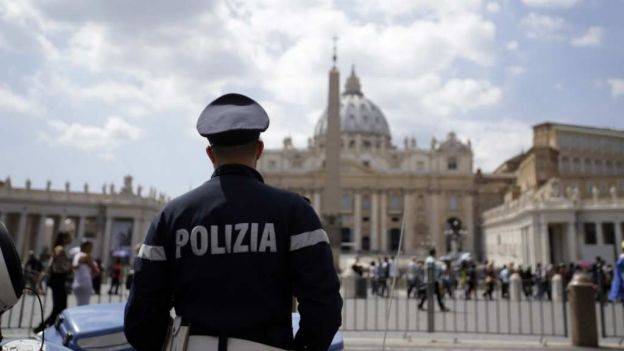President Mattarella: "Terrorists Will Not Steal Our Way of life"
In the usually jam-packed St. Peter's square Wednesday, a surprisingly low number attended the pontiff's general audience. As this indicates, although less vulnerable than France or Belgium, Italy and the independent state of the Vatican are also at risk of terror attacks, but are taking precautionary measures.
ROME -- In the usually jam-packed St. Peter's square Wednesday, a surprisingly low number, 20,000, less than half the usual number of the faithful and tourists turned out for the pontiff's usual general audience. This did not escape notice from Pope Francis, who declared that, " We shall not give up and close doors for our security." In these "difficult times," he went on to say, "The Church will have no bullet-proof doors." His words are all the more important in consideration of the Holy Year of Mercy, which begins with the opening of the Holy Door of St. Peter's Basilica on Dec. 8; of that of St. John Lateran on Dec. 13; St. Mary Major Jan 2 and St. Paul's Outside the Walls Jan 13. Already those attending audiences or entering St. Peter's to visit the Basilica or the Vatican Museums must pass through careful security checks. (See the papal audience at >>)
On Wednesday Italian President Sergio Mattarella was in Palazzo Vecchio in Florence, where he called upon Italians "not to bow to this -- we will not let them [terrorists] steal our way of life and our future.... The terrorists want to change our nature, but the European DNA is an extraordinary blend of culture, humanity, ideas of freedom and social relations. These are all part of the life we are living, and justify our desire to better ourselves. We must keep this in mind when terrorism launches an attack against our Europe, and brings death and the barbaric to one of our cities."
In concluding, President Mattarella made a special point of saying that civil liberties are not to be whittled away in order to combat terrorism. Instead, he said, we must also "guarantee security to our citizens without renouncing those liberties we enjoy. Let us defend the quality of our civilization and offer these to the world." Speaking at the Meeting at Rimini last August, the Italian President had already warned that, "Terrorism increases the fanatic distortions of faith in God with which they [IS] are trying to introduce the germs of a third world war into the Mediterranean, the Middle East and Africa."
As this indicates, although perhaps less vulnerable than France or Belgium, Italy and the independent state of the Vatican are as much at risk of terror attacks as Germany and the United States, as nervous headlines there also show. In Italy itself large and small warning notes tell the story. On Nov. 18 Franco Gabrielli, police chief (Prefect) of Rome since last April, told reporters that security guards will pay special attention to the risk of armed drones overflying the city, particularly after the opening of the Holy Year. The Paris attacks have "refocused us on targets that previously appeared more marginal to us, and so the number of objectives has increased.... The more generalized is the possibility of attack, and the more indiscriminate the target these criminals have set for their actions, the more we must continue to live our lives."
Premier Matteo Renzi promised further investments in funding for security, but at the same time said that he did not see a direct link between the terror attacks in Paris and the French air attacks in Syria. He reminded Italians that on the day prior to the attacks in Paris Italy had been responsible for the international arrests of 17 alleged terrorists. The investigation across European borders was coordinated by Italian prosecutors together with Carabinieri forces and intelligence agencies here. For Renzi, Russian president Vladimor Putin's proposal for a broad coalition against IS "would be a very positive" move because it would also help to restore the Russians to international cooperation efforts. "If we say, let's go and bomb them, we must first agree upon who we are to bomb because dividing Syria into fragments has already resulted in a series of interventions that have no unified vision."
A risk of the fallout is obviously a surge in anti-immigration sentiment, particularly because it seems apparent that one of the Paris terrorists had entered Europe hidden among migrants. "But most of the terrorists use airplanes," Renzi pointed out, "not boats. We shall continue to save human lives. We are not like the terrorists -- we save the lives of children."
At the same time, a small warning note came in Turin yesterday, when police rushed to remove a tiny but blood-red and nasty silhouette of a Kalashnikov, painted onto the wall of a school.


































i-Italy
Facebook
Google+
This work may not be reproduced, in whole or in part, without prior written permission.
Questo lavoro non può essere riprodotto, in tutto o in parte, senza permesso scritto.